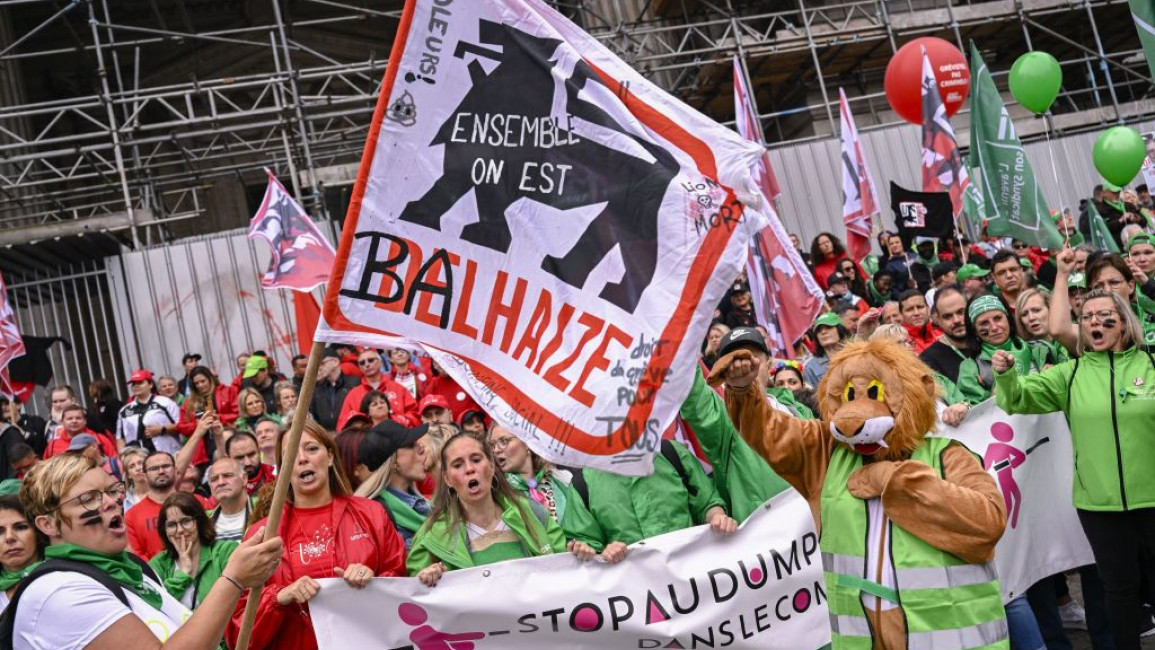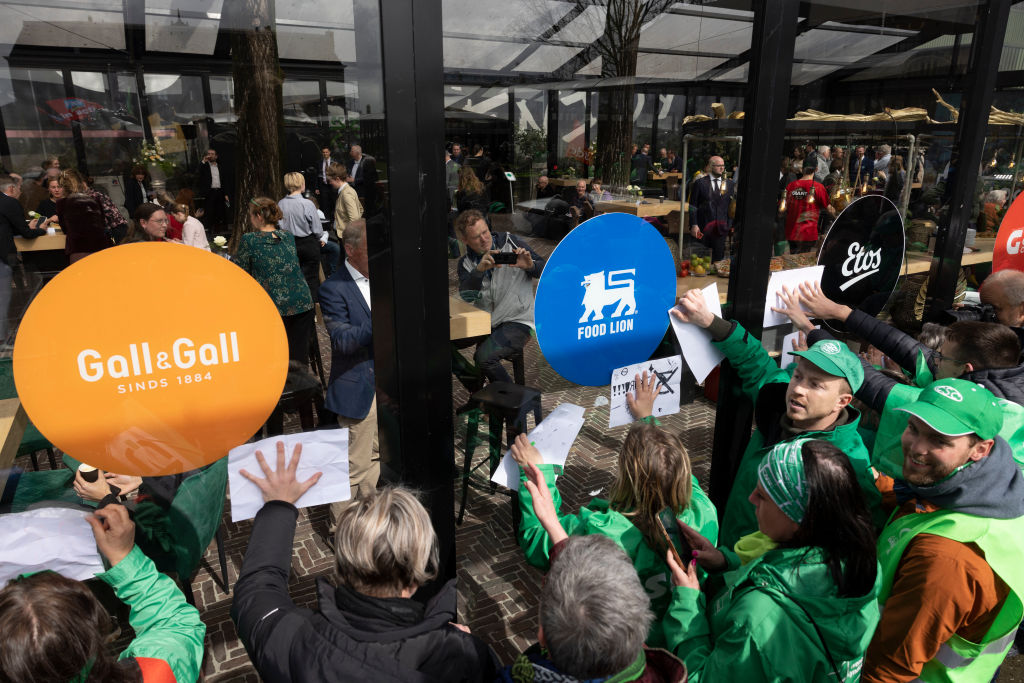Despite growing repression, workers from Belgium’s Delhaize supermarket have led the largest strike in the country’s recent history to oppose the threats to their pay & working conditions. Now, that fight is spreading, writes Thomas Englert.
Thomas Englert
11 Jun, 2023

Delhaize workers take part in a demonstration organised by trade unions FGTB-ABVV - ACV-CSC and ACLVB-CGSLB to protest against social dumping and attacks on the right to strike, in Brussels, 22 May 2023. [GETTY]
Workers from the supermarket Delhaize in Belgium have been on strike since 7 March, protesting against management’s decision to turn 128 of its supermarkets into franchises. As a result, 10,000 workers face lower wages, a deterioration of their working conditions, and the loss of union representation. To add insult to injury, the move is likely to lead to large layoffs as well.
In response to the unprecedented mobilisation by workers, Delhaize has responded with brutal repression.
Since 2016, Delhaize – known as “The Lion” after its logo – has been part of the Ahold-Delhaize group, alongside North American brands like FoodLion, Hanaford, or Giant. With over €80 billion in revenue, €2.56 billion in profit, and just under €2 billion paid out to its shareholders (via investment funds like BlackRock and Goldman Sachs Group) in 2022 alone, the group is clearly not doing badly financially. However, due to inflation slightly lowering its margins, the group announced €4 billion worth of cuts by 2025, in order to reassure investors. The decision to franchise fits into these aims.
''In Belgium, unions are relatively strong and labour law is therefore more protective of workers. Hard confrontations and long strikes are rare because dialogue is institutionalised and generally yields a more or less acceptable compromise for both employers and unions. In the case of Delhaize’s latest move, however, workers decided to go on an indefinite strike, which is unprecedented in the country’s recent history.''
Delhaize operates around 780 shops in Belgium - 128 of these are managed directly by Delhaize itself and represent about half of the group’s Belgian revenue and employ over 10,000 people. The remaining shops have been opened, under different variations of the franchise model over the last 10-15 years.
These shops are run by self-employed managers who use the Delhaize brand, follow its marketing strategy, and apply its promotions. As exclusive supplier to these franchises Delhaize controls the supply prices and often also own the shops which the franchise managers rent from the company. In other words, the franchise has at best limited control over its shop and merchandise. Delhaize, on the other hand, enjoys an almost risk-free revenue.
The only real autonomy the franchise manager has to increase profits is by driving down personnel costs and working conditions. These are, unsurprisingly, considerably worse in franchises. In addition, they operate with about 60% less staff.
This means that should the plans to franchise be successful, the majority of their current staff would lose their jobs in the medium term. Those that remain would lose pay (on average €400/month before tax), work longer hours, and face increasingly precarious working conditions. This, in a sector where wages are already 30% below the national average, and where the difficult working conditions have a documented negative effect on health and life expectancy, would be catastrophic.
Franchised shops depend massively on precarious staff such as students, temp, and agency workers. In many cases, the pressure for growth and profit leads them to break the law when it comes to work hours and opening hours, or even to use undeclared labour. For example, just after the beginning of the strike, Delhaize’s biggest franchised shop in Brussels was closed because half its work force was working without a contract.
These practices, if repugnant, are highly profitable. The unions calculated that Delhaize could gain up to €210 million a year by turning its remaining shops into franchises - five times the 2021 Belgian profits.
Strike and repression
Delhaize is a longstanding Belgian company and some of its employees have worked all their lives. The announcement that the company was selling them off therefore felt like a betrayal. Especially given that Delhaize had publicly repeated its promise not to franchise its integrated shops just 10 days prior.
In Belgium, unions are relatively strong and labour law is therefore more protective of workers. Hard confrontations and long strikes are rare because dialogue is institutionalised and generally yields a more or less acceptable compromise for both employers and unions. In the case of Delhaize’s latest move, however, workers decided to go on an indefinite strike, which is unprecedented in the country’s recent history.
The strike is peaceful but determined and organised. Picket lines have kept shops closed, while workers implemented clever strategies to limit the loss of wages while increasing the cost of the strike for the employer. Public opinion has been generally favourable and some clients even joined pickets in solidarity. A petition in support of the workers has also gathered tens of thousands of signatures.
Despite all this, Delhaize continues to snub the demands. At first, they ignored the strike, then they turned nasty. Striking workers were banned from using the toilets and management started spreading misinformation.
During negotiations, workers were met by security as well as police officers, and union representatives were frisked before entering the room. When workers picketed the annual shareholders meeting, shareholders told them to their faces they did not care about them.
Management then moved on to outright repression. They went to court to get a unilateral decision allowing bailiffs and police to threaten workers with fines if they didn’t break up the picket lines. Originally, these injunctions targeted only those pickets that physically blockaded shops, however, it quickly became about preventing all pickets.
Workers are now prevented from picketing anywhere near their shops, or any Delhaize building, or subsidiary in Belgium. Flyering clients not to enter the shops is forbidden, and workers and union representatives have been arrested by the police.
In some cases. Delhaize implemented lock outs, an approach which effectively suspends the right to strike. Whilst this tactic has been denounced by European courts in the past, legal battles will take months, if not years – time which workers do not have.
In response, workers blockaded Delhaize’s logistics depots on important days like easter weekend. The actions were soon met by police and even watercannons to breakup picket lines.

Protesters supported by the Belgian and French labor unions showing their concerns by holding leaflets to shareholders inside to raise their voice against Ahold Delhaize's proposed franchising of businesses concerning thousands employees. [GETTY]
Boycott and solidarity
Despite all of this, workers remain mobilised and those refusing to return to work remain many. Workers have resorted to guerrilla tactics to keep the strike alive: turning up to work then leaving on strike all of a sudden, chanting, blockading shops with outside help, and organising neighbourhood parties in front of shops.
Shops are being kept open by managers and newly hired students and temp workers but sales remain at 40-50% of their usual levels in most outlets.
Clients leave little notes in the isles echoing the call by workers to boycott the brand until demands are met.
The conflict is also spreading to the wider retail sector with sporadic strikes and demonstrations. The unions have entered negotiations to demand the equalisation of working conditions between franchises and integrated shops.
The three national union federations also called a demonstration at the end of last month which mobilised 25,000 people in Brussels in solidarity with the strike as well as in opposition to the national threats to the right to protest that the struggle has come to represent.
It is very clear to workers across the board that if they let Delhaize get away with this attack, franchising will become the norm for the whole sector and employers will attack the right to strike everywhere.
The Delhaize workers are fighting like Lions but they need actions and statements of solidarity from others sectors – and internationally – to increase the pressure on the employers.
Either way, the Delhaize workers’ strike is already a historic and inspiring mobilisation. One of the longest ever in Belgium’s retail sector, it has demonstrated that workers aren’t simply tools for shareholders' greed. Their struggle gives new meaning to the old P B Shelly poem:
"Rise like Lions after slumber in unvanquishable number. Shake your chains to earth like dew which in sleep had fallen on you. Ye are many. They are few."
Thomas Englert works for a trade union in Belgium (CNE). He has been active in the labour movement in Belgium and abroad for15 years. He studied Economics , History as well as a at the Global Labour University (ILO).
Opinions expressed in this article remain those of the author and do not necessarily represent those of The New Arab, its editorial board or staff.
Boycott and solidarity
Despite all of this, workers remain mobilised and those refusing to return to work remain many. Workers have resorted to guerrilla tactics to keep the strike alive: turning up to work then leaving on strike all of a sudden, chanting, blockading shops with outside help, and organising neighbourhood parties in front of shops.
Shops are being kept open by managers and newly hired students and temp workers but sales remain at 40-50% of their usual levels in most outlets.
Clients leave little notes in the isles echoing the call by workers to boycott the brand until demands are met.
The conflict is also spreading to the wider retail sector with sporadic strikes and demonstrations. The unions have entered negotiations to demand the equalisation of working conditions between franchises and integrated shops.
The three national union federations also called a demonstration at the end of last month which mobilised 25,000 people in Brussels in solidarity with the strike as well as in opposition to the national threats to the right to protest that the struggle has come to represent.
It is very clear to workers across the board that if they let Delhaize get away with this attack, franchising will become the norm for the whole sector and employers will attack the right to strike everywhere.
The Delhaize workers are fighting like Lions but they need actions and statements of solidarity from others sectors – and internationally – to increase the pressure on the employers.
Either way, the Delhaize workers’ strike is already a historic and inspiring mobilisation. One of the longest ever in Belgium’s retail sector, it has demonstrated that workers aren’t simply tools for shareholders' greed. Their struggle gives new meaning to the old P B Shelly poem:
"Rise like Lions after slumber in unvanquishable number. Shake your chains to earth like dew which in sleep had fallen on you. Ye are many. They are few."
Thomas Englert works for a trade union in Belgium (CNE). He has been active in the labour movement in Belgium and abroad for15 years. He studied Economics , History as well as a at the Global Labour University (ILO).
Opinions expressed in this article remain those of the author and do not necessarily represent those of The New Arab, its editorial board or staff.
No comments:
Post a Comment